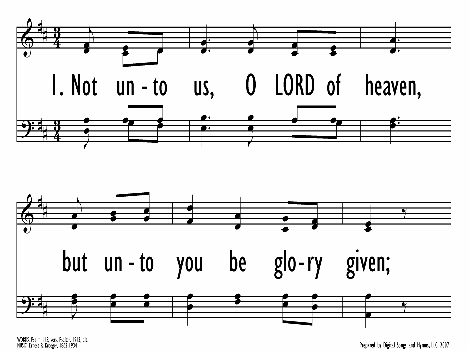- |
User Links
Not unto Us, O Lord of Heaven

Not unto us O Lord of heaven
Tune: GAIRNEY BRIDGEPublished in 13 hymnals
Printable scores: PDF, MusicXMLAudio files: MIDI, Recording
Representative Text
1 Not unto us, O LORD of heav'n,
but unto You be glory giv'n.
In love and truth; You do fulfill
their counsels of Your sov'reign will;
Though nations fail Your pow'r to own,
yet, LORD, You reign, and You alone.
2 The idol gods of heathen lands
are but the work of human hands;
They cannot see, they cannot speak,
their ears are deaf, their hands are weak.
Like them shall be all those who hold
to gods of silver and of gold.
3 Let Isr'el trust in God alone,
the LORD whose grace and pow'r are known.
To Him your full allegiance yield
and He will be your help and shield.
All those who fear Him God will bless;
His saints have proved His faithfulness.
4 All You who fear Him and adore,
the LORD increase you more and more.
Both great and small who Him confess,
you and your children He will bless.
Yes, bless'd are you by Him who made
the heav'ns and earth's foundations laid.
5 The heav'ns are God's since time began,
but He has giv'n the earth to man.
The dead praise not the living God,
but we will sound His praise abroad.
Yes, we will ever bless His name;
O praise the LORD, His praise proclaim.
Source: Psalms of Grace #115a
Text Information
| First Line: | Not unto us O Lord of heaven |
| Title: | Not unto Us, O Lord of Heaven |
| Meter: | 8.8.8.8.8.8 |
| Language: | English |
| Copyright: | Public Domain |
Notes
A liturgy of praise including an exhortation to trust in the LORD, followed by a priestly benediction.
Scripture References:
st. 1 =vv. 1-3
st. 2 = vv. 4-8
st. 3 =vv. 9-12
st. 4 = vv. 13-15
st. 5 =vv. 16-18
Number five of the eight "hallelujah" psalms (111-118), 115 was probably composed by a priest or Levite as a liturgy of praise for temple worship. Some scholars suggest that it was originally used at the dedication of the second temple (Ezra 6:16) after the return from Babylonian exile. This psalm stands third in the "Egyptian Hallel" used in Jewish liturgy at the annual religious festivals prescribed in the Torah. At Passover, Psalms 113 and 114 were sung before the meal; 115 through 118 were sung after the meal. In this psalm many voices speak. Here is a probable scenario: vv. 1-8, 12-13, and 16-18–the people; vv. 9-11–the Levitical choir; vv. 14-15–a priest. The psalmist praises God for his love, faithfulness, and sovereign power (st. 1, 5). He belittles the idols of the nations (st. 2), exhorts Israel to trust in the LORD (st. 3), and pronounces a blessing upon God's people (st. 4). The (altered) versification is from the 1912 Psalter.
Liturgical Use:
Beginning of worship; profession of faith, ordination/ commissioning, marriage, and family services (st. 3-5).
--Psalter Hymnal Handbook
Tune
GAIRNEY BRIDGEErnest Richard Kroeger (b. St. Louis, MO, 1862; d. St. Louis, 1934) wrote GAIRNEY BRIDGE in gospel-hymn style. The tune was set to Psalm 115 also in the 1912 Psalter. The tune should be sung in harmony, ably supported by organ articulation that points clearly to three beats per bar. The liturgical d…
VATER UNSER
Martin Luther's versification of the Lord's Prayer was set to this tune in Valentin Schumann's hymnal, Geistliche Lieder (1539); the tune, whose composer remains unknown, had some earlier use. The tune name derives from Luther's German incipit: “Vater unser im Himmelreich….” Because VATER UNSE…


 My Starred Hymns
My Starred Hymns



